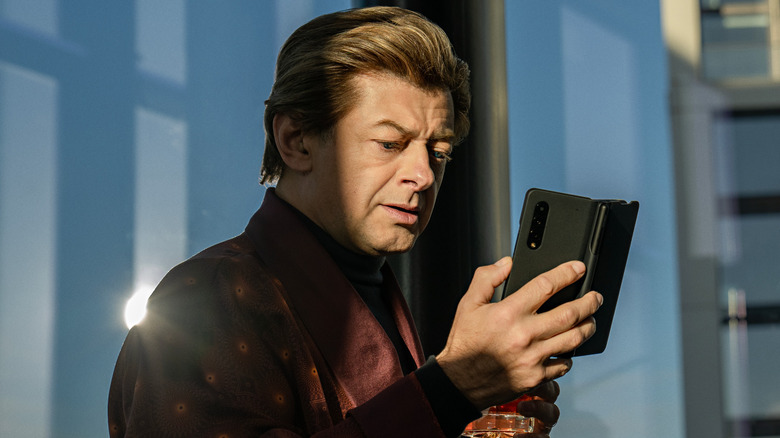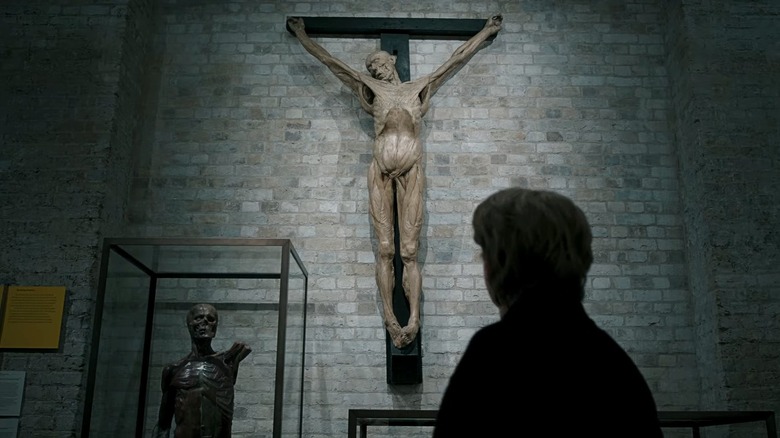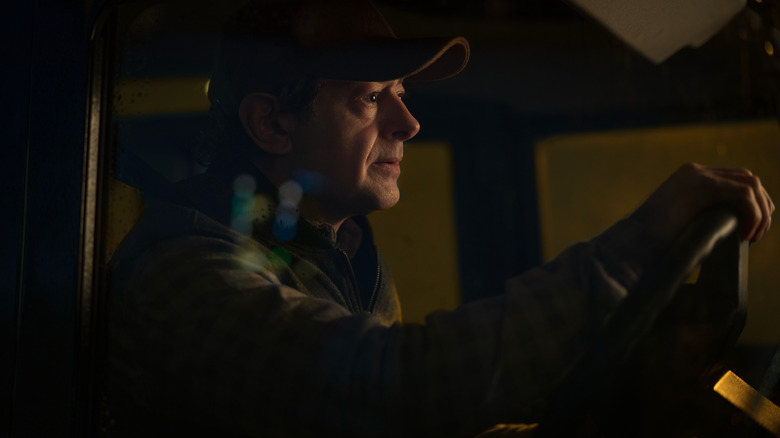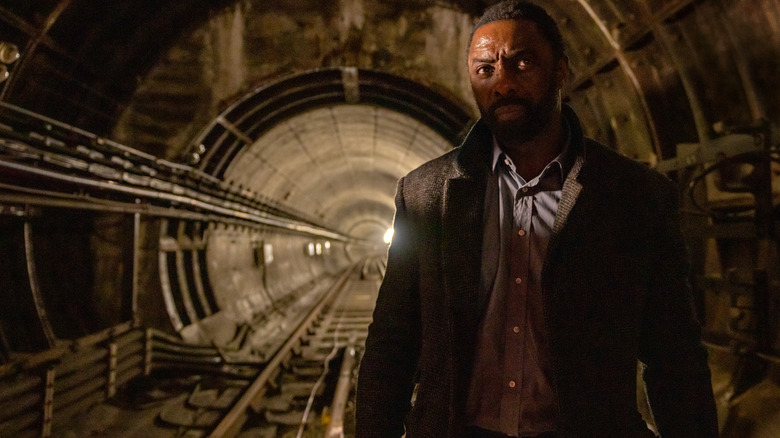Andy Serkis Journeyed To The Dark Side For Luther: The Fallen Sun [Exclusive Interview]
In his stunning three-episode arc as factory prison foreman Kino Loy in last year's "Andor," Andy Serkis presented a character that audiences were fiercely rooting for. In crime thriller "Luther: The Fallen Sun," the actor cuts right to the other end of the spectrum as sadistic serial killer David Robey. Sporting a coiffed blond 'do (yes, that's Serkis' real hair) and armed with a tech empire and a dangerous amount of wealth, Robey's particular M.O. might prompt you to stick a bit of electrical tape over your laptop camera.
With an insatiable hunger for people's most shameful secrets, Robey has an army of hackers spying on the computers, phones, smart speakers, and other devices of random unsuspecting people all over the world. He's "harvesting shame from the ether," as writer Neil Cross puts it. And with a simple threat to release this blackmail material to the world, he can puppeteer victims right into his hands — or even off the edge of a building.
Enter DCI John Luther, a "hero cop" who has built up a litany of his own sins over five seasons of BBC One's "Luther." After becoming a target of Robey's wrath, Luther finds himself stripped of the "DCI" in front of his name and sentenced to a long stretch in prison. When he breaks out in order to put a stop to Robey, "Luther: The Fallen Sun" becomes a cat-and-mouse game with Luther hunting Robey, Robey toying with Luther, and the police trying desperately to catch them both.
With the movie arriving on Netflix today, following a run in theaters, /Film spoke to Andy Serkis about the script so dark it made him want to "throw it in the bin and have a shower."
Note: This interview has been lightly edited for clarity and brevity.
'We've almost become inured to being unable to police the internet'
What was it that made you decide to take on the role, despite the darkness of the script?
I couldn't tear myself away from Neil Cross's excellent writing. Also the fact that I was going to finally get to work with Idris [Elba]. But most importantly, the reason I took it was because David Robey as a character, although initially I really just questioned whether I wanted to do it or not, I thought [it was] a fantastic opportunity to investigate the weird, wacky, wonderful world of the internet that we have completely bought into and handed all responsibility to and let define our lives [...] David Robey is a monster, but he's only partially the monster, and the main monster is actually [the] technology that we are slave to.
That is the absolute reason I took it, because I just thought it'd be a great debate, actually. It sort of opens up a debate about how we expect these days, or we wouldn't be surprised if someone were listening to us when we make a phone call. Our devices, our laptops, have got cameras, which can watch us while we're working [and] we've almost become inured to being unable to police the internet. So that was what really excited me about it. Someone who takes advantage of that, David Robey, and takes advantage of using that technology to surveil people in their own homes.
Did it make you more paranoid about technology, or were you already pretty wary of it before you did the film?
I think, no. Look, I'm aware of it. It didn't make me paranoid about it. I'm just kind of rather annoyed with myself that I don't do anything about it. I know people who do, I know lots of people who put plasters on over their laptop cameras or over their device cameras. But, I'm as guilty as the next person [of] kind of going, "I'm going to buy this" — swipe. I'm going to hand over my identity — swipe. You know, it's incredible, how powerful it's got into us all and that we are so accepting of it.
Yeah, I've certainly clicked "yes" to lots of terms and conditions that I definitely haven't read, so I'm guilty as well.
Exactly.
'He observes in tiny little boxes'
You've played villains before, but a lot of them have been kind of sympathetic. Gollum's quite a sympathetic villain, and a lot of people like him. David Robey is not particularly sympathetic. Was it difficult to get into the mind of this man, who does the things that he does?
Well, his mum loves him, though.
Can't be that bad.
Well, no. I mean, the fact of the matter is, no, it was hard. But that's the job. That is the job. Once you accept the role [...] there's a research phase where you have to just really work out what it is you want to say with the character. Then there's the stepping into the character and not being judgmental about the person you've created. Once you do that, then you create your own moral dimension and moral logic. Really for him, he is this lonely individual, someone who doesn't really exist in his own. He's only this sort of sum total of the people that he surveils in their households and watches doing the most mundane things, like washing their hair or cutting their toenails or whatever it is that he's watching. He observes in tiny little boxes, lots and lots of screens of people's lives.
That's his way into connecting with people. That's about as enjoyable as it gets for David Robey. He can't really connect with humanity. So there is a kind of sadness to the character, I think. But with that, he's created a reality where he sees someone like John Luther as a massive hypocrite, as someone who is in a position of power, has got lots of people around him that look up to him, [and] who takes the law into his own hands. Even though he's a cop, he's a policeman, he still takes the law into his own hands. Yet people are very forgiving of that because he's in the pursuit of right and being righteous. Whereas, John Luther would be very judgmental of a person like David Robey. So, [Robey is] on a mission to bring [Luther] down.
He also has a kind of real sense of theatricality, I think. Not particularly well observed, but he's reached a point in his life where things are coming to fruition in terms of the big world of the dark web where he can bring people together and could create theater for those who like to see horrible things on screen, who are as desensitized as he is. So, it's always a challenge playing characters like this, but once you've made your mind up to go down that road, then you have to completely forgive them for what they do and actually think, "It's their normality." That's life.
Towards the end, there is a moment where Luther describes him as pathetic. He says he remembers seeing him at a bus stop, and that's the moment where we really see David Robey vulnerable for the first time. Do you think that kind of cuts to the core of the character and his psychosis?
I think so, yeah. I think you're right. It's sort of, and it's also to do with, again, the most mundane thing, which is the fact that he chews his teeth, he grinds his teeth. It's someone having that kind of amount of personal information about David is intolerable because that's what he does to other people. He has that minutiae of information from observing lots of people, but to really be seen, himself — that's his undoing, for sure.
'It was quite brutal'
You filmed in some incredible locations. One that really interests me are those underground tunnels, the ghost tunnels of the London Underground. Was it spooky?
Really spooky. Do you know what the spookiest thing about shooting those tunnels was that there was a poster which said, "Britain is about to join the EU. Please vote to join. 1973." It was just like, "Oh my God, what have we done?" No, anyway, don't get me started.
A true horror story.
Yeah, true horror story. Really, really freaky, those tunnels and great to shoot in, actually. But yeah, some of those locations were amazing. Then fighting Idris in those dark tunnels, that was tough.
I imagine he's quite hard to fight there. He's quite tall.
Very powerful, and he's a kickboxer. Because we were both very much in character when we were going into the fights, it was quite brutal.
The final location I wanted to talk about is the house at the end in the snow, which is incredibly spooky and always surreal. I assume that was a built set?
Oh, yeah, the red bunker. The one that's outside, you mean?
The outside is what was quite incredible to me.
Yeah, yeah, yeah. No, it's phenomenal. That was in Iceland. Yeah, it was amazing. Amazing location, an amazing set.
"Luther: The Fallen Sun" out now in select theaters, and is also available on Netflix.



